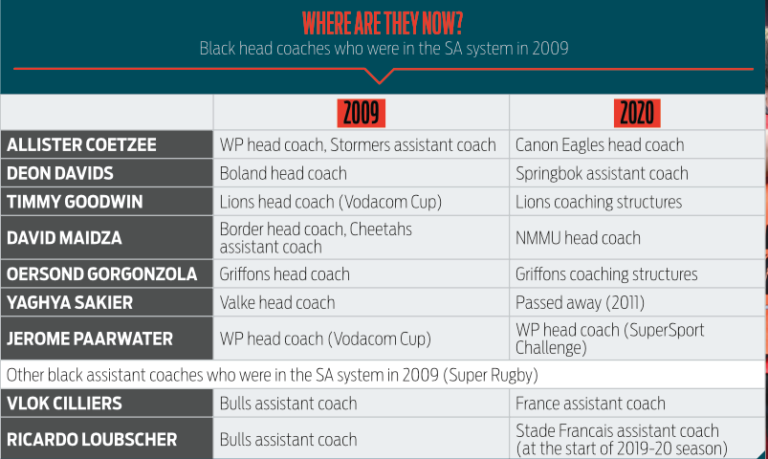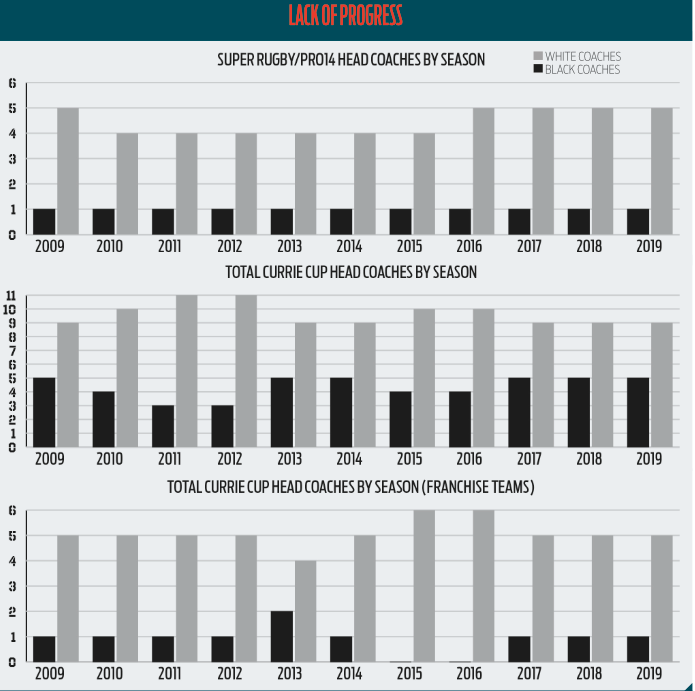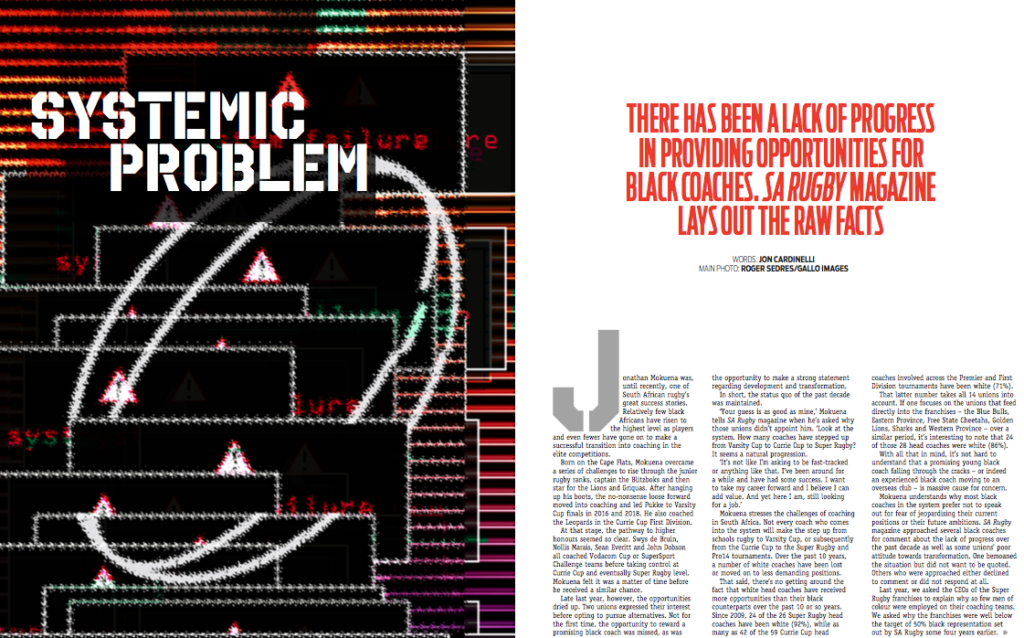There has been a lack of progress in providing opportunities for black coaches. SA Rugby magazine lays out the raw facts in a special report by JON CARDINELLI.
READ: What’s in our latest issue?
Jonathan Mokuena was, until recently, one of South African rugby’s great success stories. Relatively few black Africans have risen to the highest level as players and even fewer have gone on to make a successful transition into coaching in the elite competitions.
Born on the Cape Flats, Mokuena overcame a series of challenges to rise through the junior rugby ranks, captain the Blitzboks and then star for the Lions and Griquas. After hanging up his boots, the no-nonsense loose forward moved into coaching and led Pukke to Varsity Cup finals in 2016 and 2018. He also coached the Leopards in the Currie Cup First Division.
At that stage, the pathway to higher honours seemed so clear. Swys de Bruin, Nollis Marais, Sean Everitt and John Dobson all coached Vodacom Cup or SuperSport Challenge teams before taking control at Currie Cup and eventually Super Rugby level. Mokuena felt it was a matter of time before he received a similar chance.
Late last year, however, the opportunities dried up. Two unions expressed their interest before opting to pursue alternatives. Not for the first time, the opportunity to reward a promising black coach was missed, as was the opportunity to make a strong statement regarding development and transformation.
In short, the status quo of the past decade was maintained.
‘Your guess is as good as mine,’ Mokuena tells SA Rugby magazine when he’s asked why those unions didn’t appoint him. ‘Look at the system. How many coaches have stepped up from Varsity Cup to Currie Cup to Super Rugby? It seems a natural progression.
‘It’s not like I’m asking to be fast-tracked or anything like that. I’ve been around for a while and have had some success. I want to take my career forward and I believe I can add value. And yet here I am, still looking for a job.’
Mokuena stresses the challenges of coaching in South Africa. Not every coach who comes into the system will make the step up from schools rugby to Varsity Cup, or subsequently from the Currie Cup to the Super Rugby and Pro14 tournaments. Over the past 10 years, a number of white coaches have been lost or moved on to less demanding positions.
That said, there’s no getting around the fact that white head coaches have received more opportunities than their black counterparts over the past 10 or so years. Since 2009, 24 of the 26 Super Rugby head coaches have been white (92%), while as many as 42 of the 59 Currie Cup head coaches involved across the Premier and First Division tournaments have been white (71%).
That latter number takes all 14 unions into account. If one focuses on the unions that feed directly into the franchises – the Blue Bulls, Eastern Province, Free State Cheetahs, Golden Lions, Sharks and Western Province – over a similar period, it’s interesting to note that 24 of those 28 head coaches were white (86%).

With all that in mind, it’s not hard to understand that a promising young black coach falling through the cracks – or indeed an experienced black coach moving to an overseas club – is massive cause for concern.
Mokuena understands why most black coaches in the system prefer not to speak out for fear of jeopardising their current positions or their future ambitions. SA Rugby magazine approached several black coaches for comment about the lack of progress over the past decade as well as some unions’ poor attitude towards transformation. One bemoaned the situation but did not want to be quoted. Others who were approached either declined to comment or did not respond at all.
Last year, we asked the CEOs of the Super Rugby franchises to explain why so few men of colour were employed on their coaching teams. We asked why the franchises were well below the target of 50% black representation set out by SA Rugby some four years earlier.
Most of the CEOs assured us that they had a long-term development plan in place. Some stated that they lacked the financial resources needed to address the issue.
Two of the unions pointed out that there were people of colour among their medical, logistical and media personnel. In doing so, those unions failed to understand the need to differentiate between team management members and bona fide coaches.
SA Rugby CEO Jurie Roux expressed his disappointment in no uncertain terms. He said the governing body was doing all it could to promote black coaches from within its structures. The entire system was being compromised, Roux lamented, by unions failing to nurture and back black coaches.
‘It’s frustrating to see how the system has favoured some coaches and not others,’ Mokuena says. ‘That’s why so many coaches of colour across sports codes have made a noise recently.
‘I can’t speak for the unions regarding their choices. At some point they will have to take a risk and back a young black coach, just as they have with young white coaches. It’s very much a union-to-union thing. The region around Pukke and the Leopards is predominantly Afrikaans, yet they took a chance on me.
‘The government is placing more and more pressure on SA Rugby to transform across the board,’ Mokuena continues. ‘I’m not sure what more SA Rugby can do. Perhaps they can penalise those unions that don’t comply. At the end of the day, it’s the responsibility of the individual unions to transform.’

Transformation is a complex process that many struggle to understand. It’s not about ticking boxes or making up numbers to satisfy SA Rugby or the government, it’s about changing the collective mindset and embracing a move towards a more representative and inclusive game.
That said, the numbers – or lack thereof – do reveal a lot about those who have failed to embrace the necessary mindset. The Springboks may be a success story – the first black African captain, Siya Kolisi, led the most transformed South African side in history to the World Cup title in 2019 – but the unions haven’t done enough to further the cause.
The accompanying graphs illustrate that the situation is no better now than it was in 2009. Peter de Villiers and Allister Coetzee both had opportunities to coach the national side during this period, but only two coaches, Coetzee and Deon Davids were were backed as head coaches of a Super Rugby franchise.
Can we expect those within the current coaching ranks to step up and claim the top job in the near future? Assistant coach Vuyo Zangqa took charge of the Kings in a pre-season match earlier this year – a sign that he may well be considered for the head coach position down the line. The Stormers, after losing Paul Treu last year, have brought Rito Hlungwani into their Super Rugby set-up – albeit as an assistant coach.
What about the other franchises? The Bulls missed a trick when they appointed Pote Human instead of Deon Davids in the wake of John Mitchell’s departure in late 2018. They haven’t employed a black head coach at Currie Cup level between 2009 and 2019. While Denzil Francis (2011) and David Manuel (2014) coached the Vodacom Cup side previously, they are no longer in the mix at the highest levels.
The Lions have produced several promising young black coaches in recent times. Joey Mongalo led the U19 side to Currie Cup title victories in 2016 and 2017, while Bafana Nhleko was at the helm when the U21 team went all the way in 2016 and 2018.
Mongalo served as the Lions assistant coach in 2018 and 2019 before moving on to the Bulls this season, while Nhleko has been involved in South Africa’s junior structures since 2018. Mzwakhe Nkosi, the SA Schools coach in 2019, headed up the Lions’ SuperSport Challenge team in 2020. It remains to be seen, however, when the Lions senior side will back a black head coach.
The Cheetahs haven’t backed a black head coach at Super Rugby, Pro14, Currie Cup or even Vodacom Cup/SuperSport challenge level. Melusi Mthethwa, who is an assistant coach with the Pro14 team, has been identified by the union as a leader for the future.
Deon Kayser and Ricardo Loubscher have been at the helm of the Sharks Vodacom Cup side in the past, but are yet to receive a chance to lead the Currie Cup or Super Rugby sides of the region. Loubscher has been in the system for a long time, serving as an assistant at the Bulls, Sharks and Boks.
How has SA Rugby responded to the lack of progress? Last year, Roux told us that SA Rugby was looking at ‘mechanisms to improve the attitude’ towards transformation and black coach development in particular. When we asked for an update on the situation, he reiterated that the unions have a lot of work to do.
‘The provinces are aware of the coaching imperative,’ the SA Rugby CEO says. ‘There have been cases where our input has been sought and taken when it has come to appointments in the recent past.
‘The mechanism in place is our Strategic Transformation Development Plan 2030, which each union has signed up to on an individual basis with their own self-determined targets. The unions are annually measured against those targets and there is no place to hide when the audit is performed. It is continuously highlighted during the transformation meetings and emphasised as a priority risk area in the STDP2030.’
While the Covid-19 pandemic has had a significant financial impact on the game in South Africa, the Department of Sport and Recreation has provided SA Rugby with some funding to assist with the development of black coaches in future.
‘Each union has its own targets – on a two-year cycle to reflect the normal contracting period in professional rugby, which can be two to four years for coaches – with the overall objective of increasing black coaches at national and provincial level to 60% by 2030,’ Roux clarifies.
Despite his situation, Mokeuna is determined to break into the Springbok coaching set-up within the next decade. He understands why some coaches might pursue an alternative career in the future, though.
‘SA Rugby’s plan sounds great in theory, but I would prefer to see a change in attitude sooner rather than later. Five, eight or 10 years down the line may be too late.
‘Some of the coaches who are in the system are getting fed up with waiting. They may decide to move on. It would be a tragedy to lose all that potential, and it would be a setback in terms of what SA Rugby wants to achieve in the long run.’
*This feature first appeared in the latest SA Rugby magazine, now on sale!
Fast facts
- Only two out of six franchises (the Kings and Stormers) have backed a black Super Rugby head coach since 2009.
- As many as 25 white head coaches were used across the franchises during this period. Deon Davids coached the Kings between 2016 and 2019, while Allister Coetzee was at the helm of the Stormers between 2010 and 2015.
- Only two out of six franchises have backed a black head coach to spearhead their Currie Cup side. Coetzee coached WP between 2009 and 2014. David Maidza was in charge of Eastern Province in 2013, Ryan Felix in 2017 and 2018 and Chumani Booi in 2019.
- Coetzee (head coach, 2016-17) and Davids (assistant coach, 2020-) have gone on to hold positions at the Springboks. The national side has employed two other black coaches over the past decade – Ricardo Loubscher (assistant coach, 2012-2015) and Mzwandile Stick (assistant coach, 2016, 2018-) – but both are yet to hold a head coach position at a level higher than Vodacom Cup/SuperSport Challenge.





